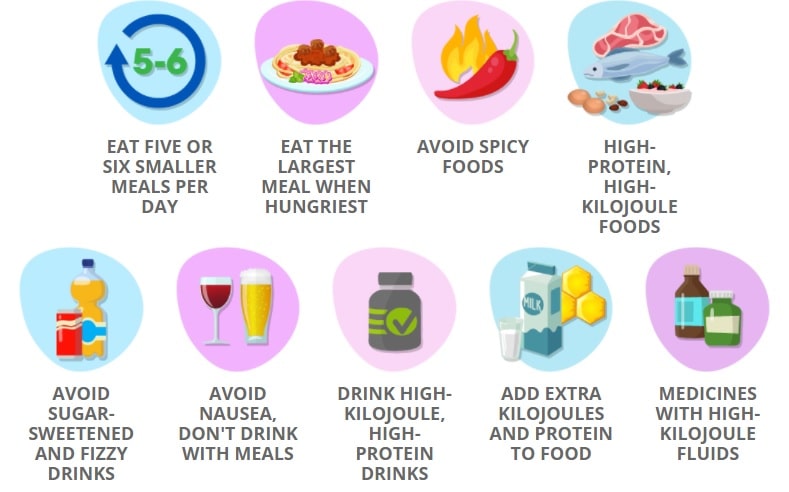Cancer and Nutrition
Cancer and Nutrition


Back to top
WHY IS EATING SO IMPORTANT
Apart from obtaining and staying at a healthy weight, good eating helps improve your mood and prevent or reduce the risk of other health conditions such as cardiovascular disease and type 2 diabetes. It’s particularly important to eat the right kinds of food before, during and after cancer treatment to help you feel better, stay stronger and stimulate the immune system. A healthy diet includes eating and drinking enough foods and liquids to provide sufficient nutrients (vitamins, minerals, protein, carbohydrates, fat and water) that the body needs.
Back to top
STOCKING UP BEFORE YOUR TREATMENT
Try and stock up your fridge/freezer and pantry so you don’t have to worry too much about shopping once you start your treatment. Here are a few useful tips:
- Make sure these are foods you can eat when you’re not feeling well.
- Cook larger portions of your favourite (correct) foods and freeze meal-sized portions.
- Buy easy-to-prepare foods such as nut butter, soup, canned fish or chicken, cheese and eggs.
Back to top
LOSS OF APPETITE
This is a common problem with people diagnosed with cancer and if it leads to weight loss and even malnutrition, it can slow down recovery and even damage the immune system. Try these ideas to improve your appetite and avoid this happening to you: 

If nausea is a problem:
- Sip on clear liquids at room temperature or cooler
- Eat sitting up and keep your head raised for about an hour after eating
- Don't drink with meals
If vomiting is a problem:
- Avoid eating or drinking until the vomiting is controlled
- Sip on small amounts of clear liquids such as cranberry or pomegranate juice.
- Nibble plain foods such as pretzels or crackers
If you find changes in taste and smell try:
- Foods and drinks with a sharp acidic or sour taste (oranges, grapefruit, melon, grapes, cranberries, cherries, pickles, sourdough bread)
- Mild marinades and spices
- If meat becomes less appealing try other sources of proteins (poultry, fish, beans, eggs)
- If food tastes bitter or salty, try adding small amounts of sugar
- Brush teeth and tongue and rinse regularly, especially before eating
- Rinse your mouth a few times a day with a mixture made up of one litre of water with one teaspoon of salt and one teaspoon of baking soda) or an alcohol-free mouthwash
Back to top
FOODS TO AVOID DURING CANCER TREATMENT
- Cold hot dogs or any deli lunch meat, including dry-cured salami – always cook or reheat until meat is steaming hot
- Unpasteurised (raw) milk and milk products, including raw milk yoghurt and soft cheeses such as blue-veined, brie, camembert, feta and goat cheese
- Deli-prepared salads with egg, ham, chicken or seafood
- Refrigerated pâté
- Unwashed fresh fruits and vegetables, including salad leaves
- Unpasteurised fruit juice or cider
- Raw sprouts
- Raw or undercooked beef (especially minced beef) or other raw or undercooked meat and poultry
- Raw or undercooked shellfish, like oysters – which may carry hepatitis A virus and must be cooked thoroughly to destroy the virus
- Sushi and sashimi (raw fish) including frozen fish labelled ‘sushi or sashimi' grade.
- Undercooked eggs, such as soft boiled, over easy and poached
- Raw, unpasteurised eggs or foods made with raw egg, such as raw dough or homemade mayonnaise

Medical References
Email: [email protected]
September 29, 2022
Content Disclaimer:
You understand and acknowledge that all users of the Dis-Chem website or app are responsible for their own medical care, treatment, and oversight. All of the content provided on the website, are for INFORMATIONAL PURPOSES ONLY and DOES NOT CONSTITUTE THE PROVIDING OF MEDICAL ADVICE and is not intended to be a substitute for independent professional medical judgment, advice, diagnosis, or treatment. The content is not intended to establish a standard of care to be followed by a user of the website. You understand and acknowledge that you should always seek the advice of your physician or other qualified health provider with any questions or concerns you may have regarding your health. You also understand and acknowledge that you should never disregard or delay seeking medical advice relating to treatment or standard of care because of information contained in or transmitted through the website. Medical information changes constantly. Therefore the information on this website or on the linked websites should not be considered current, complete or exhaustive, nor should you rely on such information to recommend a course of treatment for you or any other individual. Reliance on any information provided on this website or any linked websites is solely at your own risk.





